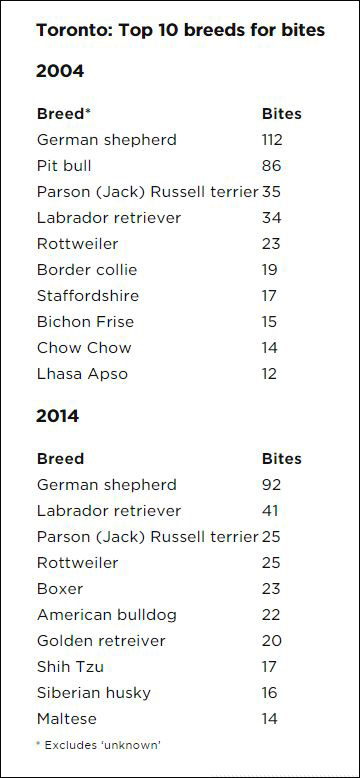Almost a dog’s lifetime later, it’s still controversial.

In 2005, in the wake of disturbing dog attacks, Ontario passed a law designed to permanently remove pit bulls — and dogs that looked like them — from the province.
The law stopped short of a total ban, at least in the short term, but went some distance in that direction. Under the law, four breeds (pit bull terriers, American Staffordshire terriers, Staffordshire bull terriers and American pit bull terriers) had to be kept muzzled or leashed in public and sterilized within two months of the bill’s passage.
It also became illegal to import them into the province. The four breeds are often referred to together as ‘pit bulls’.
“Over time, it will mean fewer pit bull attacks and, overall, fewer attacks by dangerous dogs,” then-attorney general Michael Bryant told the Ontario legislature in 2005.
Bryant did not respond to an interview request.
The law certainly succeeded in cutting bites by the four affected breeds — Toronto recorded only 19 in 2014, down from 112 in 2005.
It’s not surprising, since there are far fewer of them around to bite anyone — there were only 338 registered in Toronto in 2014, down from 1,411 in 2005. Also, since the dogs were supposed to be unable to breed starting in 2005, the remaining ones are becoming elderly. Gradually, they are dying off without being replaced. They should cease to exist in the city by 2020 or so, at least in theory.
That isn’t airtight — the Toronto Humane Society still sees the occasional pit bull puppy come in to its shelter, says spokesperson Tegan Buckingham.

Get daily National news
What it hasn’t succeeded in doing is reducing the total number of dog bites (though it looked that way for a time). Toronto’s reported dog bites have been rising since 2012, and in 2013 and 2014 reached their highest levels this century, even as pit bulls and similar dogs neared local extinction.
Graphic: As pit bulls disappear, dog bites rise
When Ontario’s ban was being debated in 2004, opinions split between those who saw pit bulls as uniquely dangerous, and those who argued that any big dog could be very dangerous, if mistreated or trained to be violent.
“I’m not surprised at all by those statistics,” says Parkdale-High Park MPP Cheri DiNovo, an opponent of breed-specific bans. “I would think they were inevitable.”
DiNovo favours a system more like Calgary’s, where officials avoided breed-based bans while promoting education of dog owners and children, combined with enforcement. Bites in Calgary have dropped dramatically since the mid-1980s.
“The current law isn’t working, and thankfully we’re getting the stats to back that up. Anybody who’s been on this issue for a long time knows that it’s a predictable failure.”
WATCH: Abandoned dog, vet eat breakfast together in kennel
Toronto’s dog bite statistics are based on reports that doctors who treat bites are required to file, says Mary Lou Leiher, a program manager at the city’s animal services department.
Bites from German shepherds (Toronto’s #4 dog, after Labradors, Shih Tzus and golden retrievers) were most common in 2004 and 2014. Bites from pit bulls and Staffordshires were less common in 2014 than ten years earlier, but bites from American bulldogs and boxers were more common.
The bites reflected in the data vary in seriousness:
“People are afraid that they are going to get a disease from being bitten by an animal, so it doesn’t have to be severe at all for them to go to the doctor,” Leiher explains.
The breed of the offending dog in the city bite data is based on what the owner, or a city investigator, says it is. There has been no procedural change in recent years that would cause there to be more bite reports out of proportion to actual bites, she said.
“We would love to see the pit bull ban lifted,” Buckingham says. “Of the ones that come into the shelter, the majority are the sweetest dogs.”
In the meantime, they are shipped to shelters in Quebec.
By 2012, the Ontario Veterinary Medical Association estimated that the law had led to over 1,000 dogs and puppies in Ontario having been needlessly put down.









Comments